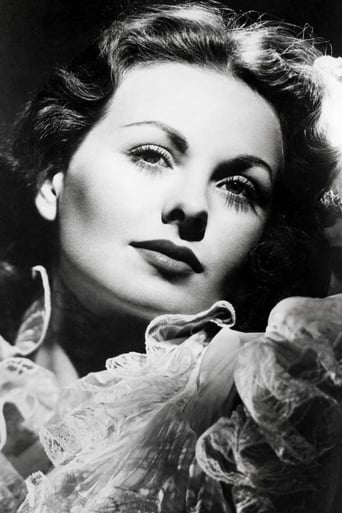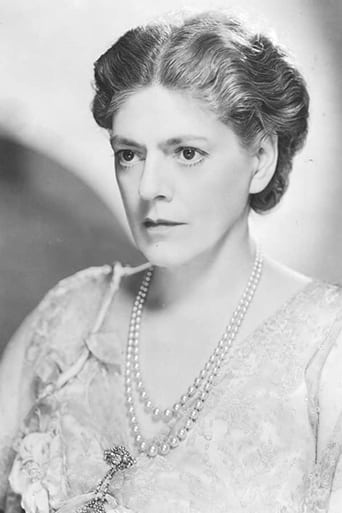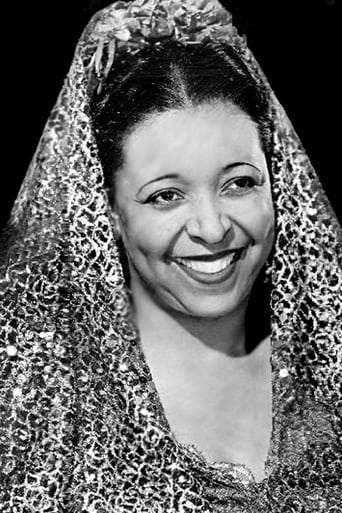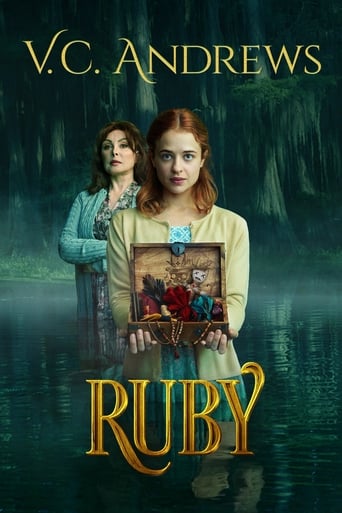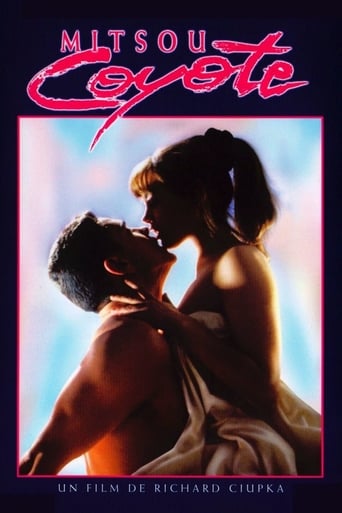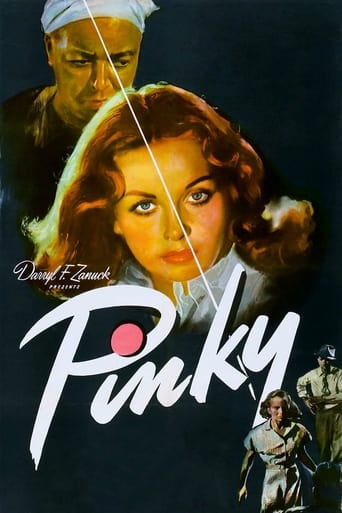
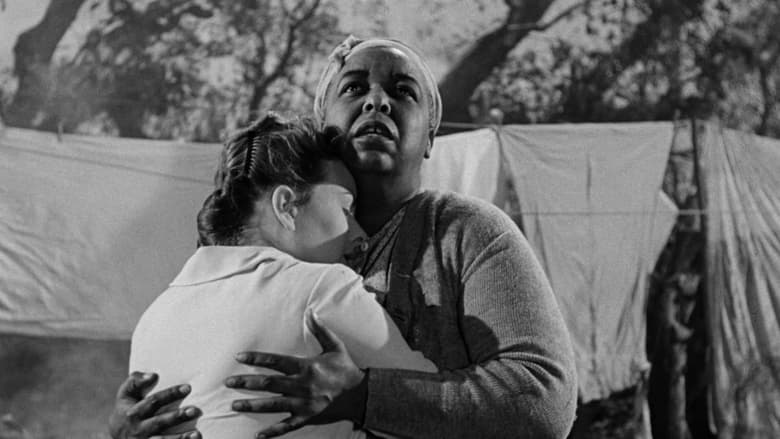
Pinky (1949)
Pinky, a light skinned black woman, returns to her grandmother's house in the South after graduating from a Northern nursing school. Pinky tells her grandmother that she has been "passing" for white while at school in the North. In addition, she has fallen in love with a young white doctor, who knows nothing about her black heritage.
Watch Trailer
Cast
Similar titles
Reviews
That was an excellent one.
The film makes a home in your brain and the only cure is to see it again.
This is one of the few movies I've ever seen where the whole audience broke into spontaneous, loud applause a third of the way in.
By the time the dramatic fireworks start popping off, each one feels earned.
It is interesting that a light-skinned black actress was not chosen to play the title role; perhaps this decision was made with an eye on box office. There is nothing about Crain that suggests that she's even one percent black, straining the credibility of the story. Having said that, Crain does a fine job of conveying the frustrations of a person treated as sub-human because of her race. She is well supported by the two Ethels, with Waters particularly effective as Crain's grandmother. As is often the case with Kazan, he overplays the issue to some extent. Everything is black and white (so to speak); there are no gray areas in the way the characters behave.
There's a lot going on in this very well made and very courageous (for its time) movie. It deals with questions of identity, justice and pride. It was directed by Elia Kazan, one of the great directors, who took the job after replacing another great director - John Ford, who left because of differences wit producer Darryl Zanuck."Pinky" is the title character - interestingly enough played by white actress Jeanne Crain, after black actresses such as Lena Horne and Dorothy Dandridge were rejected by Zanuck. I say "interestingly" because the character of Pinky is a "Negro" (in the language of the day) - a Negro with very light skin, whose southern grandmother sent her off to the north to school to become a nurse. While north, Pinky began to "pass" - others assumed because of her skin colour that she was "white", and much of the first part of the movie is about Pinky's struggles to adjust to being back in the south when she returns home. She's suddenly confronted with the reality of racial prejudice; she yearns to go back to the north. But her grandmother (Ethel Walters) wants her to stay and become the nurse to a white neighbour, Miss Em (Ethel Barrymore.) Pinky reluctantly agrees, and after an uncertain start bonds with Miss Em and becomes the heir to Miss Em's house and land after her death.At this point, the movie becomes about justice, and it's very well done. It's unthinkable that a black woman would receive such an inheritance. Those who expected to be the heirs challenge the will in court, and the struggle is a nasty one. Pinky wants what's rightfully hers, but is it worth the cost and the risk? After winning the case, her lawyer says to her (in the line that really stood out for me): "Well Pinky. You won. You got the house and the land. You got justice. But I doubt if any other interests of this community have been served." This was her own lawyer speaking. Shouldn't justice be the interest of the community? What other interests are there? What other interests are so important that her own lawyer apparently feels that receiving "justice" may not have been the best thing? But when the justice was being given to a black woman - even if she didn't look black - apparently there were other important things to consider. There's a sense of foreboding about this part of the movie; a fear that a mob mentality is going to break out; that violence will be the end result of the court case.The movie ends on a note of pride, as Pinky chooses to reject the possibility of leaving with her white fiancé from the north and instead stays and helps a local black doctor open a clinic and nursery school for black children in the house she inherited. In other words, Pinky chooses to embrace her heritage and her people. It was a very touching end to a somewhat troubling movie.Jeanne Crain, Ethel Barrymore and Ethel Walters were all nominated for Academy Awards for their performances, and I can certainly appreciate that it was a courageous movie for 1949, dealing with the harsh reality of racism, and even featuring (if mostly in the background) the inter- racial relationship between Pinky and her fiancé Tom (William Lundigan,) which apparently (even though Crain was a white actress) caused the movie to be banned in some southern communities. (7/10)
John Ford is said to have directed part of this but, as it developed, he and Ethel Waters couldn't stand one another and Ford turned the helm over to Elia Kazan. (It doesn't look typical of the work of either man.) Basically, the eponymous character is a registered nurse who has left her job in Boston and returned to her childhood home in the African-American neighborhood of a rural Southern town. She lives with her black grandmother although Pinky herself couldn't look more "white" if she'd been Jeanne Crain or somebody.At first, as Crain wanders about the little town, folks think she's white but when it is revealed that she has a black grandmother, Ethel Waters, she's treated with the amiable disdain blacks in the rural South had to get along with in 1949.The scene in which her True Colors are revealed is emblematic. Crain visits a black man in the seedier part of the colored neighborhood. Taking note of this, a young black woman is seized with jealousy. An altercation erupts. The redneck cops arrive and break up the fight, and when the black woman says something like, "She ain't nothing but a colored gal herself," the cops slap her around. The Head Cop turns to Crain and asks with a chuckle, "It ain't true, is it?" Upon finding that it IS, the cops slap CRAIN around! It's interesting, from a sociological point of view, that Jeanne Crain, despite her severe hair style, looks and acts as white as any of the good townsfolk. It's that drop of black blood that is the criterial attribute. Genetically she may be only one sixteenth African, but she's coded as "colored" by everyone who knows about it. This is known as "the social construction of reality." She's colored not because she's mostly of African descent but because everyone agrees that she's colored. The same is true of Halle Berry (half "white") and Barack Obama (our first "black" president).Jeanne Crain as Pinky demonstrates her range as an actress, which isn't much but isn't dismissable either. She's a beautiful woman and in "Leave Her To Heaven", a few years earlier, was radiant. But there she was cheerful and self contained, and here she's sullen and pouting -- and that's about it. Ethel Waters gets the job done. Ethel Barrymore does rather more than that, and the supporting players do a professional job.One thing that struck me is that, except for a couple of incidents, race really played little part in the story. An outsider from Boston disrupts the little town and insinuates herself into the good graces (and the will) of the town's richest dying old lady. The mansion and its contacts go to the damned Yankee nurse instead of the local folks who know tradition when they see it.No one should be ashamed of his or her participation in this production. It's the product of seasoned talent, except for Elia Kazan who was just getting started. It doesn't preach. There are no Big Speeches about racism. In fact, the retired judge who sees to it that Crain gets Barrymore's mansion leaves her, saying that the outcome of the trial contesting the will, though it has gotten Crain the crumbling mansion, will bring no advantages to the community. That thought is insightful and neatly expressed.The denouement is improbable in the extreme. It's unlikely that Pinky would decide to stay in that rude community, much less turn her old mansion into a school for children. And it's frankly IMPOSSIBLE that when her white doctor boyfriend from Boston arrives, eager for marriage, she would throw him out and decide to stay with "her own kind." A NURSE -- rejecting an opportunity to marry a DOCTOR? The last shot has the camera descend on Crain's glowing face as she rings the bell for Em's School For Girls to start. A heavenly choir may be heard. She's found fulfillment. That happily sentimental shot could have come from John Ford, who sides with tradition even if nobody else does.
I feel that the user reviews were articulate and genuine but the casting improper. Jeanne Crain is too fair to portray a black woman. A better choice would have been Jennifer Jones. It is not only skin color, but features. As beautiful as Halle Berry is, for example, she is not as white as Jeanne Crain. The grouchy relative of Ms. Em even said: "Why, she's whiter than me."The film is good but the one thing that left me disappointed was this one factor. I know women who have no black heritage in their ancestory yet they have a darker complexion and broader features than Ms. Crain.Trite point? Probably, but it distracted me from the essence of the film.
